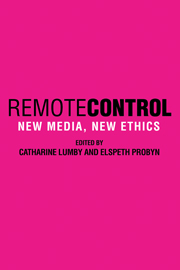Book contents
- Frontmatter
- Contents
- List of Contributors
- Acknowledgements
- 1 Introduction: An Ethics of Engagement
- 2 Real Appeal: The Ethics of Reality TV
- 3 Arguing about Ethics
- 4 ‘Their own media in their own language’
- Beyond the Disconnect: Practical Ethics
- 5 A Viable Ethics: Journalists and the ‘Ethnic Question’
- 6 Ethics, Entertainment and the Tabloid: The Case of Talkback Radio in Australia
- Money versus Ethics
- 7 Eating into Ethics: Passion, Food and Journalism
- Beyond Food Porn
- 8 Ethics impossible? Advertising and the Infomercial
- Pitching to the ‘Tribes’: New Ad Techniques
- 9 Diary of a Webdiarist: Ethics Goes Online
- 10 Control-SHIFT: Censorship and the Internet
- Representing the Asylum Seekers
- 11 The Ethics of Porn on the Net
- Ethics and Sex
- 12 Grassroots Ethics: The Case of Souths versus News Corporation
- 13 Great Pretenders: Ethics and the Rise of Pranksterism
- The Limits of Satire
- Index
13 - Great Pretenders: Ethics and the Rise of Pranksterism
Published online by Cambridge University Press: 18 December 2009
- Frontmatter
- Contents
- List of Contributors
- Acknowledgements
- 1 Introduction: An Ethics of Engagement
- 2 Real Appeal: The Ethics of Reality TV
- 3 Arguing about Ethics
- 4 ‘Their own media in their own language’
- Beyond the Disconnect: Practical Ethics
- 5 A Viable Ethics: Journalists and the ‘Ethnic Question’
- 6 Ethics, Entertainment and the Tabloid: The Case of Talkback Radio in Australia
- Money versus Ethics
- 7 Eating into Ethics: Passion, Food and Journalism
- Beyond Food Porn
- 8 Ethics impossible? Advertising and the Infomercial
- Pitching to the ‘Tribes’: New Ad Techniques
- 9 Diary of a Webdiarist: Ethics Goes Online
- 10 Control-SHIFT: Censorship and the Internet
- Representing the Asylum Seekers
- 11 The Ethics of Porn on the Net
- Ethics and Sex
- 12 Grassroots Ethics: The Case of Souths versus News Corporation
- 13 Great Pretenders: Ethics and the Rise of Pranksterism
- The Limits of Satire
- Index
Summary
ON THE FIRST DAY OF THE ANNUAL BRISBANE WRITERS' FESTIVAL IN 2000, festival-goers were treated to an aerial banner display, with the words ‘Poetry Wrecks Lives’ emblazoned across it. Down on the ground, approximately twenty people were gathered, protesting the ‘irresponsible’ promotion of poetry at the festival. Spokesperson for the group, who called themselves ‘Young People Against Poetry’, Ben Eltham, said that they were angry at the way Queensland's cultural elite continued to encourage young people to take up the dangerous activity of poetry. ‘Most people think that poetry is nothing more than a frivolous pastime that young people can experiment with and will grow out of, but this is not the case’, said Eltham. ‘Many young people become trapped in a life of bohemian excess, wasting their talents and making no worthwhile contribution to society.’
Their organised demeanour and serious tone had some members of the media confused until another spokesperson explained the real object of the stunt. It wasn't poetry the group had a problem with; it was their belief that the Brisbane Writers' Festival was dominated by an outdated and hierarchical understanding of literary culture.
Talking to Ian Townsend on ABC radio's The World Today, protester Mark Fula explained:
Look, it's not poetry per se but it's what the Writers' Festival think of as poetry … Their insistence on promoting old creative forms is stifling the ability of the festival to promote what young people are really engaged in, which is exciting activities like hypertext writing, zine-making, legal graffiti, hip hop … It's only by challenging people's artistic preconceptions that they can develop and grow and expand their horizons.
- Type
- Chapter
- Information
- Remote ControlNew Media, New Ethics, pp. 230 - 242Publisher: Cambridge University PressPrint publication year: 2003



